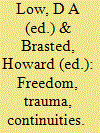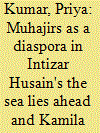| Srl | Item |
| 1 |
ID:
047843


|
|
|
|
|
| Edition |
1st ed.
|
| Publication |
New Delhi, Sage Publications, 1998.
|
| Description |
ix, 237p.hbk
|
| Standard Number |
8170366798
|
|
|
|
|
|
|
|
|
|
|
|
Copies: C:1/I:0,R:0,Q:0
Circulation
| Accession# | Call# | Current Location | Status | Policy | Location |
| 043878 | 954.04/LOW 043878 | Main | On Shelf | General | |
|
|
|
|
| 2 |
ID:
149786


|
|
|
|
|
| Summary/Abstract |
This essay argues that diaspora is a useful analytical category for understanding certain migrant populations engendered by Partition, but not all Partition migrants can be designated as diasporas. Through a close reading of two novels—Intizar Husain's The Sea Lies Ahead (translated from the Urdu original Aage Samandar Hai by Rakhshanda Jalil) and Kamila Shamsie's Kartography—I show how Urdu-speaking migrants from India's Muslim minority provinces who migrated to the urban centres of Sindh have invented and preserved themselves as a diaspora in post-Partition Pakistan. Both novels enable us to see how Muhajirs have become a community based on a shared ideology of displacement that is kept alive in the group's memory.
|
|
|
|
|
|
|
|
|
|
|
|
|
|
|
|
| 3 |
ID:
149785


|
|
|
|
|
| Summary/Abstract |
From the mid 1980s onwards, urban Sindh has often been in the grip of ethnic violence. The Muhajir Qaumi Movement (now known as the Muttahida Qaumi Movement), established at around the same time, has played a central role in these conflicts. Most analyses interpret the violence as an escalation of already-existing communal differences between various migrant groups in cities like Karachi and Hyderabad. In this paper I argue that violence itself has often been constitutive of ethnic identity and ethnic mobilisation. Tracing the background of the language of ethnicity in Pakistani politics since Independence, I analyse how ethnic identity politics and violence have often gone hand in hand, beginning with the student activism of the late 1970s and developing into full-scale ethnic conflict during the 1980s and 1990s. This enables us to move away from primordial and communal interpretations of ethnic identity towards an analysis of ethnic identity in terms of political mobilisation.
|
|
|
|
|
|
|
|
|
|
|
|
|
|
|
|